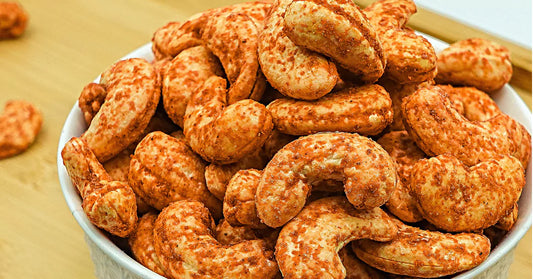Is it safe to eat cashews while I'm breastfeeding my baby?
Short answer: Yes, it is generally safe to eat cashews while breastfeeding. Cashews are nutrient-dense and can be part of a healthy diet for nursing mothers, providing essential vitamins, minerals, and healthy fats.
Long answer:
Nutritional benefits: Cashews are rich in protein, healthy fats, and essential nutrients. They contain vitamins E, K, and B6, as well as minerals like copper, zinc, and magnesium. These nutrients can support both maternal health and breast milk production. Moderation is key: While safe, it's important to consume cashews in moderation. Excessive consumption of any food can potentially impact breast milk composition. Individual tolerance: Each mother and baby pair may have different reactions to foods in the maternal diet. Some babies may be more sensitive to certain foods than others. Allergy considerations: If you have a family history of nut allergies, consult your healthcare provider before consuming cashews. Monitor your baby for any signs of allergic reactions or sensitivities. Preparation matters: Opt for raw or dry-roasted cashews without added salt or flavors. Avoid cashews with excessive additives or preservatives.I noticed some sources say cashews can cause gas in babies. Have other moms experienced this?
Short answer: Some mothers report that consuming cashews may cause gas in their breastfed babies. However, this is not a universal experience and can vary from one baby to another.
Long answer:
Anecdotal evidence: Some mothers have reported increased gassiness in their babies after consuming cashews. These reports are largely anecdotal and not scientifically proven. Individual differences: Babies' digestive systems are unique and may react differently to various foods in the mother's diet. What causes gas in one baby may not affect another. Other potential causes: Gas in babies can be caused by various factors, not just maternal diet. Factors like feeding position, latch, and overall digestive development can contribute to gas. Keeping a food diary: If you suspect cashews are causing gas, keep a food diary to track your intake and your baby's symptoms. This can help identify patterns and potential food sensitivities. Consultation with healthcare provider: If you're concerned about your baby's gas, consult with your pediatrician. They can provide personalized advice based on your baby's health and symptoms.How many cashews can I safely eat each day while breastfeeding?
Short answer: A safe daily intake of cashews while breastfeeding is typically around 1 ounce (28 grams) or about 18 cashews. This amount provides nutritional benefits without excessive calorie intake.
Long answer:
Recommended serving size: One ounce (28 grams) of cashews is considered a standard serving. This equals approximately 18 whole cashews. Nutritional content: One ounce of cashews provides: About 160 calories 5 grams of protein 13 grams of healthy fats Various vitamins and minerals Calorie considerations: Breastfeeding mothers need about 300-500 extra calories per day. Cashews can contribute to this increased calorie need when consumed in moderation. Balancing with other foods: Incorporate cashews as part of a varied, balanced diet. Don't rely solely on cashews for your nutritional needs. Individual factors: Your specific calorie needs may vary based on factors like: Your pre-pregnancy weight Activity level Whether you're exclusively breastfeedingAre there any signs my baby might be sensitive to cashews through my breast milk?
Short answer: Signs of cashew sensitivity in breastfed babies may include excessive gas, fussiness, rashes, or changes in stool. However, these symptoms can have multiple causes and are not definitively linked to cashew consumption.
Long answer:
Digestive symptoms: Increased gas or bloating Changes in stool consistency (e.g., looser or more frequent) Diarrhea or constipation Behavioral changes: Increased fussiness or irritability Difficulty sleeping Excessive crying, especially after feedings Skin reactions: Rashes or hives Eczema flare-ups Dry or itchy skin Respiratory symptoms: Wheezing or difficulty breathing (rare, but serious) Congestion or runny nose Other potential signs: Vomiting (in severe cases) Poor weight gain or growthShould I introduce cashews to my baby's diet separately before I eat them while breastfeeding?
Short answer: It's not necessary to introduce cashews to your baby's diet before consuming them while breastfeeding. However, when introducing solid foods, follow your pediatrician's guidance on introducing potential allergens like nuts.
Long answer:
Breastfeeding and maternal diet: You can eat cashews while breastfeeding without introducing them to your baby's diet first. The proteins in cashews that pass through breast milk are different from those in whole cashews. Introducing solid foods: Current guidelines recommend introducing potential allergens, including nuts, around 4-6 months of age. Always consult your pediatrician before introducing new foods to your baby. Gradual introduction: When introducing cashews to your baby's diet, start with small amounts. Observe for any reactions over a few days before increasing the amount. Preparation for babies: Never give whole nuts to babies due to choking hazards. Use smooth nut butters or finely ground nuts mixed into other foods. Family history considerations: If there's a history of nut allergies in your family, consult an allergist before introducing cashews to your baby.I'm allergic to tree nuts, but cashews seem different. Can I still eat them while breastfeeding?
Short answer: If you have a diagnosed tree nut allergy, you should avoid cashews while breastfeeding, even if they seem different. Cashews are botanically related to other tree nuts and can cause allergic reactions.
Long answer:
Botanical classification: Cashews are technically seeds but are classified as tree nuts for allergy purposes. They belong to the same family as poison ivy and mango. Cross-reactivity: People allergic to one type of tree nut may react to others due to similar proteins. About 25-40% of people with one tree nut allergy are allergic to multiple types. Allergy testing: If you're unsure about your cashew allergy status, consult an allergist. They can perform specific tests to determine if you're allergic to cashews. Risk of anaphylaxis: Tree nut allergies, including cashews, can cause severe reactions like anaphylaxis. It's not worth risking your health while breastfeeding. Alternative nutrients: If you can't eat cashews, focus on other nutrient-rich foods to support breastfeeding. Consult a dietitian for safe alternatives that provide similar nutrients.Are there any alternative nuts that are safe and healthy to eat while breastfeeding?
Short answer: Yes, there are several alternative nuts and seeds that are safe and healthy for breastfeeding mothers. These include almonds, walnuts, pumpkin seeds, and sunflower seeds, all of which offer various nutritional benefits.
Long answer:
Almonds: Rich in vitamin E, magnesium, and healthy fats May help boost milk production Walnuts: High in omega-3 fatty acids, which are beneficial for baby's brain development Good source of antioxidants Pumpkin seeds: Excellent source of zinc and iron Contain healthy fats and protein Sunflower seeds: High in vitamin E and selenium Good source of healthy fats and protein Chia seeds: Rich in omega-3 fatty acids and fiber High in calcium and ironI'm worried about my cashew intake affecting my baby's milk supply. Is there any connection?
Short answer: There's no scientific evidence suggesting that moderate cashew consumption negatively affects milk supply. In fact, the nutrients in cashews may support overall maternal health and potentially benefit milk production.
Long answer:
Nutritional support: Cashews contain nutrients that support overall health, which is crucial for milk production. They provide healthy fats, protein, and minerals that can contribute to a balanced diet. Hydration: Adequate hydration is more crucial for milk supply than specific foods. Ensure you're drinking enough water throughout the day. Caloric intake: Maintaining sufficient calorie intake is important for milk production. Cashews can contribute to meeting increased caloric needs during breastfeeding. Individual variations: Every woman's body responds differently to various foods. If you notice any changes in milk supply, consult a lactation specialist. Balanced diet: Focus on a varied, balanced diet rather than relying heavily on any single food. Include a mix of fruits, vegetables, whole grains, and lean proteins alongside nuts.My baby seems fussy after I eat cashews. Could it be something else I'm eating?
Short answer: While cashews could potentially cause fussiness in some babies, it's important to consider other foods in your diet as well. Common culprits include dairy, caffeine, spicy foods, and gas-producing vegetables.
Long answer:
Dairy products: Cow's milk protein can pass through breast milk and cause fussiness in some babies. Consider eliminating dairy for 2-3 weeks to see if it makes a difference. Caffeine: Some babies are sensitive to caffeine in breast milk. Limit or avoid coffee, tea, chocolate, and energy drinks. Spicy or acidic foods: These can change the taste of breast milk, potentially causing fussiness. Examples include citrus fruits, tomatoes, and heavily spiced dishes. Gas-producing vegetables: Broccoli, cauliflower, cabbage, and onions can cause gas in some babies. Monitor your intake of these vegetables and observe your baby's reactions. Keeping a food diary: Track what you eat and your baby's behavior to identify potential patterns. This can help pinpoint specific foods that may be causing issues.Conclusion
Cashews can be a nutritious addition to a breastfeeding mother's diet when consumed in moderation. While they offer valuable nutrients, it's important to be mindful of potential sensitivities and individual reactions. Always consult with healthcare professionals for personalized advice, and remember that a varied, balanced diet is key to supporting both maternal health and breast milk production.
1. Moderation is key: Aim for about 1 ounce (28 grams) of cashews per day.
2. Monitor your baby: Watch for signs of sensitivity or allergic reactions.
3. Consider alternatives: If cashews cause issues, try other nuts or seeds for similar nutritional benefits.
4. Maintain a balanced diet: Include a variety of foods to ensure optimal nutrition for you and your baby.
5. Consult professionals: Always seek advice from your healthcare provider or a lactation specialist if you have concerns.














